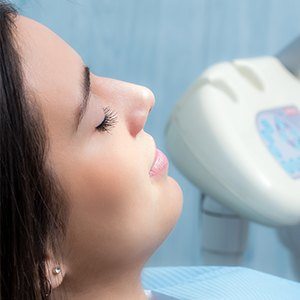Sedation Dentistry – Bloomfield, CT
Breeze Through Your Dental Appointments

Between 30 and 40 million people in the U.S. avoid the dentist due to fear. At Family Dental Practice of Bloomfield, we want to help even our most anxious patients relax during any dental visit. Sedation dentistry has helped many people who fear the dentist get the oral health care they need. In addition to helping patients with dental anxiety, sedation can also help people with a sensitive gag reflex, who need complex procedures, and who have very sensitive teeth or gums. Our dental office offers three levels of sedation dentistry in Bloomfield, CT: nitrous oxide, oral conscious, and IV dental sedation.
Why Choose Family Dental Practice of Bloomfield for Sedation Dentistry?
- Multiple Sedation Options Available
- Safety Is a Top Priority
- Stay Relaxed Even During Major Treatments
Oral Conscious Dental Sedation

Oral conscious sedation is unique because it can be administered before you ever leave home. This is ideal for patients who have severe dental anxiety. Your dentist will prescribe a medicinal sedative that is taken at home before your appointment, or as soon as you arrive at our dental office. Oral sedation relaxes patients even more than nitrous oxide. While most remain awake during the procedure, almost all patients claim they do not remember their visit. Sedatives affect everyone differently, but most patients are fully functional within 12 hours.
What Is Oral Conscious Sedation?

With oral conscious sedation, all you have to do is take a small pill shortly before your treatment is scheduled to begin. No masks or needles are necessary, making this option ideal for patients who are nervous around such things. Within about 15 minutes or so of swallowing the sedative, you should start to feel very calm and relaxed. The medications used for this type of sedation can vary, but some of the most common options include Valium, Ativan, and Halcion.
How Does Oral Conscious Sedation Work?

Oral conscious sedation is quite powerful, and it will be unsafe for you to drive while under its influence. Therefore, you should have a friend or family member available to take you to and from your appointment.
The sedation itself may make you feel groggy or sleepy; you might drift off during your appointment. However, since this technique is not meant to cause total unconsciousness, it should be easy for our team to awaken you with gentle stimuli.
Several hours after your appointment, the sedation should wear off, at which point you may have no recollection of your procedure.
Are You a Good Candidate for Oral Conscious Sedation?

Oral conscious sedation might be a suitable option for you if:
- You struggle with moderate to severe dental anxiety or fear.
- You are reluctant to undergo necessary care due to nerves or fear of pain.
- You have a very sensitive gag reflex.
- You require multiple or complex treatments in a single appointment.
- You have a condition that makes it difficult for you to sit still or keep your mouth open for an extended period.
- You are not easily numbed by local anesthesia.
- You do not have any significant contraindications for the use of oral sedatives, such as pregnancy or certain respiratory conditions.
IV Sedation

Intravenous anesthesia sedation, also known as IV sedation, is the deepest form of sedation offered at Family Dental Practice of Bloomfield. Still only considered a moderate level of sedation, some patients sleep through the procedure while others remain awake. It is rare that a patient will remember any part of the procedure after receiving IV sedation. Even though IV sedatives offer a much deeper level of sedation, patients are usually still able to return to their normal activities within a day or so.
What Is IV Sedation?

IV sedation uses a small needle, inserted into the arm or hand, to deliver sedative medication directly into your bloodstream. It takes effect very quickly, and it can do much to promote a relaxed state of mind and comfortable treatment experience.
You might sometimes hear IV sedation referred to as “sleep dentistry” or “twilight sedation,” but keep in mind that its purpose is not to cause unconsciousness. Although some patients drift off to sleep while under its influence, you should maintain the ability to respond to questions and directions from our team.
The effects of IV sedation can linger for up to a full day, so you should set aside some time to rest. You should also avoid driving while you remain under its influence.
Who Is a Good Candidate for IV Sedation?

You might be a suitable candidate for IV sedation if:
- You struggle with moderate to severe dental anxiety or fear.
- You have a very sensitive gag reflex.
- Local anesthesia is not very effective at numbing your oral tissues.
- Due to a medical condition, you find it difficult to sit still for extended periods or to keep your mouth open for a long time.
- You require extensive or invasive procedures.
Additionally, as your IV sedation dentist, our team will review your medical history to make sure you do not have any serious contraindications for IV sedation. For example, it may not be safe for you if you are pregnant or have certain respiratory conditions.
The Benefits of IV Sedation

IV sedation offers some outstanding benefits:
- IV sedation produces a deep state of relaxation, allowing you to get through dental procedures without excessive stress or discomfort.
- Because the sedative is delivered directly into the bloodstream, its calming effects begin almost immediately, providing quick relief from anxiety.
- Our team can precisely control and adjust the level of sedation throughout the treatment, allowing for optimal comfort and safety.
- This method helps prevent the formation of traumatic dental memories, reducing the chances of dental phobia and encouraging regular future visits.
- It can improve oral health outcomes for people who might otherwise avoid dental care due to overwhelming fear or anxiety.
Sedation Dentistry FAQs
Is Sedation Dentistry Safe?
As a sedation dentist in Bloomfield, your safety is our highest priority. Sedation dentistry, which includes oral conscious sedation and intravenous (IV) sedation, has been used safely for many years and has a track record of effectiveness.
Before recommending sedation, we will thoroughly review your medical history, current medications, and any health concerns. This careful approach helps us determine the safest and most effective method for your needs.
You will be closely monitored throughout your procedure, so we can take fast action on the off-chance that you have a bad reaction to sedation.
Is Sedation Dentistry Safe While Pregnant?
In most cases, dental procedures that require sedation should be postponed until after pregnancy, as the safety of certain sedatives has not been fully established for developing babies. There is a risk that the medications used will pass through the placenta and affect the fetus.
Fortunately, local anesthesia is considered safe during pregnancy, so if you need a procedure that cannot be delayed, you can still have a relatively comfortable treatment process.
Will I Remember Anything with Dental Sedation?
With oral conscious sedation, you will likely remember little, if anything, from your procedure. This form of sedation does not put you to sleep, but it does produce a state of deep relaxation and may cause you to feel drowsy or detached from the procedure. Most patients report that the entire appointment feels like a brief, dreamlike experience.
IV sedation is also likely to cause a degree of memory loss. Although it does not induce unconsciousness, it is sometimes called “sleep dentistry” because it can make you feel as if you were unconscious.
What Does It Feel Like to Be Sedated at the Dentist?
When you receive oral conscious sedation, you should feel calm, relaxed, and free from anxiety. The medication typically takes effect before your procedure begins, helping you feel at ease from the moment you arrive. You may feel slightly drowsy, but you will remain conscious and able to communicate with our team if needed.
With IV dental sedation, you will experience a deeper level of relaxation, and many patients report feeling as though they are drifting in and out of sleep. The effects set in quickly as the medication is administered directly into your bloodstream. You will remain responsive to verbal cues but may not recall details of your visit.
How Much Does Sedation Dentistry Cost?
The cost of sedation dentistry varies depending on the type of sedation used and the complexity of your dental treatment. IV dental sedation is typically more expensive than oral conscious sedation, reflecting the additional expertise and monitoring involved during the procedure.
Prior to your appointment, we will provide you with a detailed explanation of all costs involved so you can make an informed decision. Our staff is happy to discuss payment options and help you maximize any dental insurance benefits you may have.
